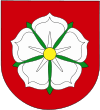Zagórów
Zagórów [zaˈɡuruf] (German: Hinterberg) is a town in Słupca County, Greater Poland Voivodeship, Poland, with 2,908 inhabitants (2004).
Zagórów | |
|---|---|
Baroque Saints Peter and Paul church with the gate | |
 Flag  Coat of arms | |
 Zagórów | |
| Coordinates: 52°9′56″N 17°53′30″E | |
| Country | |
| Voivodeship | Greater Poland |
| County | Słupca |
| Gmina | Zagórów |
| First mentioned | 1240 |
| Town rights | 1407/1445 |
| Area | |
| • Total | 3.44 km2 (1.33 sq mi) |
| Population (2006) | |
| • Total | 2,932 |
| • Density | 850/km2 (2,200/sq mi) |
| Time zone | UTC+1 (CET) |
| • Summer (DST) | UTC+2 (CEST) |
| Postal code | 62-410 |
| Website | http://www.zagorow.pl |
History
The town's name is of Old Polish origin and comes from the word zagór.[1] The oldest known mention of the settlement comes from a document from 1240.[1] Zagórów received town rights from King Władysław II Jagiełło in 1407, however, these rights were implemented only in 1445.[1] Administratively it was part of the Kalisz Voivodeship of the Greater Poland Province of the Polish Crown. The town suffered as a result of the 17th-century Polish–Swedish wars.[1]
It was annexed by Prussia during the Second Partition of Poland in 1793. Regained by the Poles in 1807, as part of the short-lived Duchy of Warsaw, it passed to the Russian Partition of Poland in 1815.[1] Polish insurgents were active in the area during the January Uprising in 1863, and a battle was fought in the nearby village of Myszaków.[1] As part of Anti-Polish repressions after the fallen uprising, the tsarist administration stripped Zagórów of its town rights in 1869.[1] Town rights were restored in 1919, after Poland regained independence.[1] In the interbellum the local economy revived.[1]
During the German occupation of Poland (World War II), on November 21-22, 1939, 10 Polish inhabitants of Zagórów, former participants of the Polish Greater Poland uprising (1918–19), were murdered by the Germans in the forest in the nearby village of Grabina.[2] The Germans expelled Poles to the so-called General Government, and in 1940 they created a ghetto for Jews in the town, to which people were also brought from other places.[1] After the liquidation of the ghetto in 1942, Jews were murdered in the forest near Kleczew. In Zagórów, the Germans murdered about 570 Poles and Jews.[1]
References
- "Położenie i historia". Urząd Miejski Zagórów (in Polish). Retrieved 13 April 2020.
- Maria Wardzyńska, Był rok 1939. Operacja niemieckiej policji bezpieczeństwa w Polsce. Intelligenzaktion, IPN, Warszawa, 2009, p. 210 (in Polish)